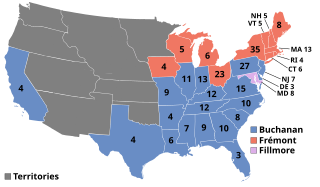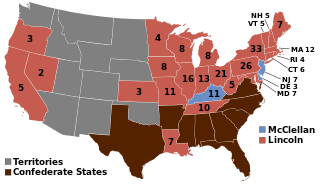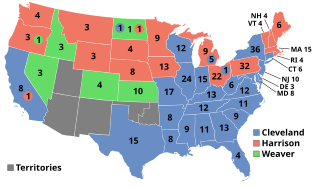
Presidential elections were held in the United States on November 2, 1852. Democratic nominee Franklin Pierce defeated Whig nominee General Winfield Scott.

Presidential elections were held in the United States on November 4, 1856. Democratic nominee James Buchanan defeated Republican nominee John C. Frémont and Know Nothing/Whig nominee Millard Fillmore. The main issue was the expansion of slavery as facilitated by the Kansas–Nebraska Act of 1854. Buchanan defeated President Franklin Pierce at the 1856 Democratic National Convention for the nomination. Pierce had become widely unpopular in the North because of his support for the pro-slavery faction in the ongoing civil war in territorial Kansas, and Buchanan, a former Secretary of State, had avoided the divisive debates over the Kansas–Nebraska Act by being in Europe as the Ambassador to the United Kingdom.

Presidential elections were held in the United States on November 6, 1860. The Republican Party ticket of Abraham Lincoln and Hannibal Hamlin won a national popular plurality, a popular majority in the North where states had already abolished slavery, and a national electoral majority comprising only Northern electoral votes. Lincoln's election thus served as the main catalyst of the states that would become the Confederacy seceding from the Union. This marked the first time that a Republican was elected president. It was also the first presidential election in which both major party candidates were registered in the same home state; the others have been in 1904, 1920, 1940, 1944, and 2016. Lincoln's 39.7% of the popular vote is to date the lowest for any winner not decided by a contingent election.

Presidential elections were held in the United States on November 8, 1864, near the end of the American Civil War. Incumbent President Abraham Lincoln of the National Union Party easily defeated the Democratic nominee, former General George B. McClellan, by a wide margin of 212–21 in the electoral college, with 55% of the popular vote. For the election, the Republican Party and some Democrats created the National Union Party, especially to attract War Democrats.

Presidential elections were held in the United States on November 5, 1872. Incumbent President Ulysses S. Grant, the Republican nominee, defeated Democratic-endorsed Liberal Republican nominee Horace Greeley.

Presidential elections were held in the United States on November 8, 1892. In the fourth rematch in American history, the Democratic nominee, former president Grover Cleveland, defeated the incumbent Republican President Benjamin Harrison. Cleveland's victory made him the first president in American history to be elected to a non-consecutive second term, a feat not repeated until Donald Trump was elected in 2024. The 1892 election saw the incumbent White House party defeated in three consecutive elections, which did not occur again until 2024.

Presidential elections were held in the United States on November 4, 1924. Incumbent Republican President Calvin Coolidge won election to a full term. Coolidge was the second vice president, after Theodore Roosevelt, to ascend to the presidency and then win a full term.

Alfred Alexander Taylor was an American politician and lecturer from eastern Tennessee. He served as the 34th governor of Tennessee from 1921 to 1923, one of three Republicans to hold the position from the end of Reconstruction to the latter half of the 20th century. He also served three terms in the U.S. House of Representatives, from 1889 to 1895.

Benton McMillin was an American politician and diplomat. He served as the 27th governor of Tennessee from 1899 to 1903 and represented Tennessee's 4th district in the United States House of Representatives from 1879 to 1899. He served as a diplomat during the administration of President Woodrow Wilson, initially as Minister to Peru (1913–1919) and afterward as Minister to Guatemala (1920–1921).

Ben Walter Hooper, was an American politician who served two terms as the 31st governor of Tennessee from 1911 to 1915. Elected as a Fusionist candidate, he was one of just three Republicans to hold the office from the end of Reconstruction to the last quarter of the 20th century. His success was due to divisions in the state Democratic Party over prohibition; he received support from some of the party. During his two terms, Hooper signed several prohibition laws, enacted a measure requiring mandatory school attendance, and signed a law requiring direct pay for women workers.

Thomas Clarke Rye was an American politician who served as the 32nd governor of Tennessee from 1915 to 1919. An ardent supporter of prohibition of alcoholic beverages, he helped reunify the state's Democratic Party, which had been divided over the issue for nearly a decade. Rye is perhaps best remembered for enacting the "Ouster Law," which was aimed at curbing the power of political boss E. H. Crump.

Richard Wilson Austin was an American politician, attorney and diplomat. A Republican, he served in the United States House of Representatives from 1909 to 1919, representing Tennessee's 2nd district. Prior to his congressional tenure, he worked as a United States Marshal from 1897 to 1906, and served as the U.S. consul to Glasgow, Scotland, from 1906 to 1907.

The 1912 United States presidential election in Tennessee took place on November 5, 1912, as part of the 1912 United States presidential election. Tennessee voters chose twelve representatives, or electors, to the Electoral College, who voted for president and vice president.

The 1934 Tennessee gubernatorial election was held on November 6, 1934. Incumbent Democratic governor Hill McAlister won re-election to a second term, defeating Independent nominee Lewis S. Pope in a rematch with 61.8% of the vote.

The 1922 Tennessee gubernatorial election was held on November 7, 1922. Democratic nominee Austin Peay defeated incumbent Republican governor Alfred A. Taylor with 57.9% of the vote.

The 1914 Tennessee gubernatorial election was held on November 3, 1914. Democratic nominee Thomas Clarke Rye defeated incumbent Republican governor Ben W. Hooper with 53.55% of the vote.

The 1910 Tennessee gubernatorial election was held on November 8, 1910. Incumbent Democratic governor Malcolm R. Patterson initially sought a third term but withdrew from the race after securing his party's nomination. Senator and former Democratic governor Robert Love Taylor was nominated after Patterson's withdrawal. On the Republican side, Ben W. Hooper defeated Alfred A. Taylor, Robert's brother, for the Republican nomination. In the general election, Ben W. Hooper defeated Robert Love Taylor with 51.89% of the vote.

The 1900 Tennessee gubernatorial election was held on November 6, 1900. Incumbent Democratic governor Benton McMillin defeated Republican nominee John E. McCall with 53.86% of the vote.

The 1898 Tennessee gubernatorial election was held on November 8, 1898. Incumbent Democratic governor Robert Love Taylor did not seek re-election. Democratic nominee Benton McMillin defeated Republican nominee James Alexander Fowler with 57.92% of the vote.

The 1902 Tennessee gubernatorial election was held on November 4, 1902. Incumbent Democratic governor Benton McMillin did not seek re-election. Democratic nominee James B. Frazier defeated Republican nominee Henry Tyler Campbell with 61.77% of the vote.

















